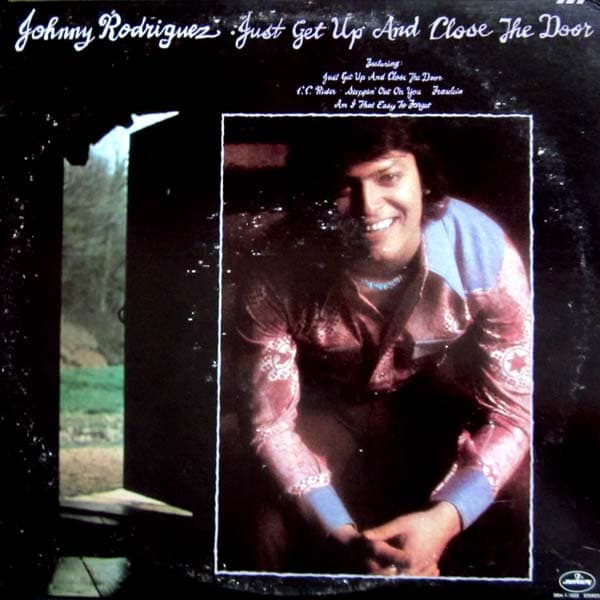
The Quiet Resolve to End a Lingering Heartache
There are songs that, with a single phrase, encapsulate an entire emotional landscape. For fans of classic country music, particularly those who remember the heartfelt honesty of the 1970s, the name Johnny Rodriguez immediately conjures images of a warm smile and a voice steeped in authentic emotion. He was a trailblazer, bringing a distinct Latin flair and undeniable charisma to the country charts. Today, we revisit a poignant moment from his celebrated career, a song that speaks to the quiet strength needed to draw a line in the sand of a failing relationship: “Just Get Up And Close The Door.”
“Just Get Up And Close The Door” was released in 1975, a year when Johnny Rodriguez was firmly established as one of country music’s brightest stars. This powerful ballad was featured on his album “Just Get Up and Close the Door,” which itself performed well on the country albums chart. As a single, the song was a tremendous success, hitting number one on the Billboard Hot Country Singles chart. This marked his fifth chart-topper, solidifying his reputation as a consistent hitmaker and a beloved figure in the genre. Its widespread popularity at the time speaks to its universal message and the powerful, relatable scenario it depicted, resonating deeply with listeners who had experienced similar emotional impasses in their own lives. Its enduring appeal is a testament to the raw honesty conveyed through Rodriguez’s performance.
The story behind “Just Get Up And Close The Door” lies with its gifted songwriters, Buddy Killen and Mark Sherrill. Killen, a veteran Nashville producer and songwriter, had a keen understanding of the human heart and the simple, direct language needed to express complex emotions in country music. The song’s premise is elegantly straightforward: a speaker addressing a partner who is subtly, yet unmistakably, trying to leave. Instead of begging or pleading, the speaker chooses to empower the partner to make the final, definitive move. This unique perspective, focusing on the agency of the person departing rather than the anguish of the one left behind, gave the song a dignified and mature emotional core. Johnny Rodriguez’s delivery perfectly captured this nuanced emotion. He didn’t sing it with anger or despair, but with a weary acceptance and a quiet resolve, a performance that undoubtedly connected with countless listeners who recognized that difficult, inevitable moment in their own relationships.
The meaning of “Just Get Up And Close The Door” is a profound statement about the painful but necessary act of ending a relationship when the emotional connection has clearly faded. It’s a refusal to prolong the agony of a slow, drawn-out goodbye. The singer recognizes the partner’s desire to leave and, rather than clinging to a hope that no longer exists, offers them the final, liberating push. “If you don’t love me, honey, you don’t have to stay,” is a line that speaks volumes about self-respect and the bittersweet freedom that comes with acknowledging an undeniable truth. It’s about recognizing when love has run its course and having the strength to allow the other person to walk away, even if it breaks your own heart in the process. For older readers, this song brings forth memories of those pivotal moments in life when one had to make tough decisions for the sake of emotional clarity, choosing dignity over prolonged despair.
Listening to “Just Get Up And Close The Door” today, Johnny Rodriguez’s voice is as rich and expressive as ever. The understated arrangement, typical of the era’s country ballads, allows his vocals to carry the full weight of the song’s emotion. There’s a certain melancholy in his tone, but also a quiet strength, a sense of having come to terms with an inevitable outcome. It’s a beautifully crafted song that reminds us of the raw honesty that defined the best of 1970s country music, and the timeless ability of a simple melody and direct lyrics to convey profound human experience. It stands as a testament to Rodriguez’s artistry and his lasting impact, resonating with anyone who has ever had to face the quiet, difficult truth that it’s time to close a door, even if it leads to an empty room.